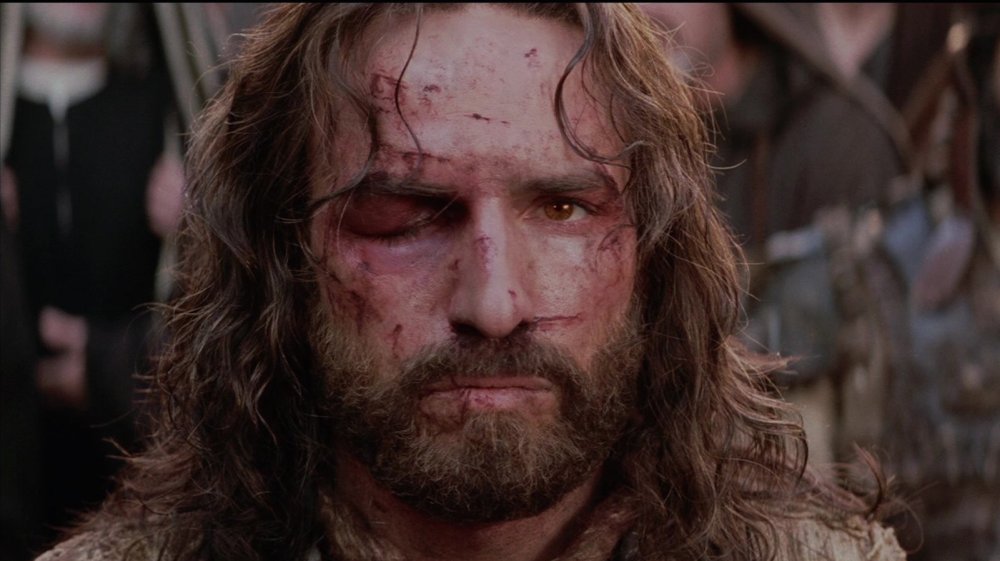How Passion Of The Christ Ruined Jim Caviezel's Career
In 2004, only two movies out-grossed Mel Gibson's The Passion of the Christ: Shrek 2 and Spider-Man 2. The controversial film about the crucifixion of Jesus remains the top-grossing R-rated movie of all time, with even Deadpool's foul mouth failing to match the movie's impressive $370 million record. Despite the film's box office success, Jim Caviezel, who starred as Jesus in the movie, claims that The Passion of the Christ effectively ended his mainstream acting career.
A quick look at the actor's IMDb page more-or-less backs up his assertion. Since he took on the role of Jesus, Caviezel has continued working, but he's largely starred in B-movie action flicks and faith-based films. However, the star has taken his virtual blacklisting in stride. During an interview with Breitbart, he explained that defending the film and his faith is more important to him than scoring roles in Hollywood's hottest properties.
"I had no choice. I had to defend it. I had to fight to survive," he said. "The film exploded. It was off the charts. You'd think, 'Oh, you're going to work a lot.' No, I didn't. I was no longer on the studio list. That was gone. ... Because of what I do as an actor — that's my skill — it was given to me from God. I really felt that faith was much bigger than the industry and Hollywood, and bigger than the Republican or Democratic Party or any of that."
Did The Passion of the Christ really kill Jim Caviezel's career?
While it's true that Caviezel hasn't landed a superhero role or starred in any Oscar-bait movies since 2004, his career is hardly over. In 2006, he starred alongside Denzel Washington in the action blockbuster Deja Vu, and in 2011 he scored the lead role on CBS' Person of Interest. The series about a supercomputer that can identify people who will be involved in a violent crime before it happens was a hit for the network, and subsequently aired for five seasons.
Since Person of Interest ended, Caviezel has continued to find work in films like 2018's The Ballad of Lefty Brown starring Bill Pullman and Peter Fonda, and in Infidel, one of the few movies to actually open in theaters in 2020. The actor's career certainly hasn't been flashy, but between his TV work and a glut of faith-based films, he still has a fanbase. His celebrity isn't going to rival Chris Evans' anytime soon, but for those in the know, Caviezel hasn't disappeared into the annals of film history just yet.
Will Jim Caviezel's career be resurrected by The Passion of the Christ?
Caviezel remains firm in his faith, and even though he's expressed that he feels shut out of the Hollywood system, he's taking on the role of Jesus once more for Gibson's sequel to The Passion of the Christ. The actor had better buckle up, because the film, tentatively titled The Passion of the Christ: Resurrection, could be controversial even among its target audience. As reported by Newsweek, the sequel is tackling a theological question that's dicey even among Christians: What happened during the three days before Jesus rose from the dead?
Catholics believe that Jesus spent his time preaching in Hell, while evangelicals (who made the first film a success) don't believe that Christ visited Satan prior to his resurrection. For now, Gibson and Caviezel are among the only people who know what's in the sequel's script, and whatever the director has come up with, Caviezel is more than a little excited for the public to see the end result.
"Mel Gibson just sent me the third picture, the third draft," Caviezel told Breitbart. "It's coming. It's called The Passion of the Christ: Resurrection. It's going to be the biggest film in world history."
Well, if Caviezel's prediction pans out, then the actor won't have to worry about Hollywood blacklisting anymore. Surely the only way to follow up a starring role in the "biggest film in world history" would be retirement, right?


